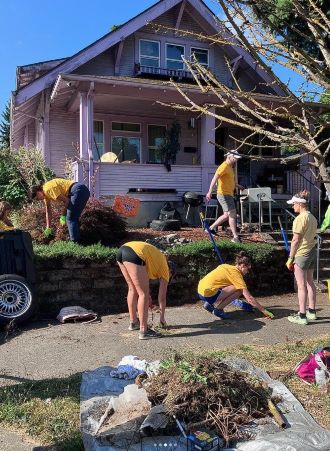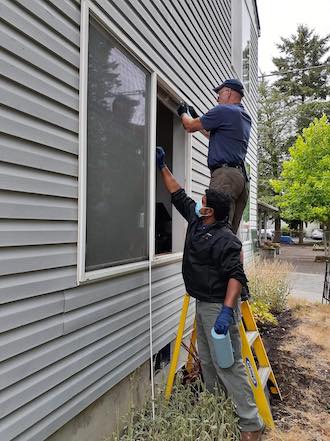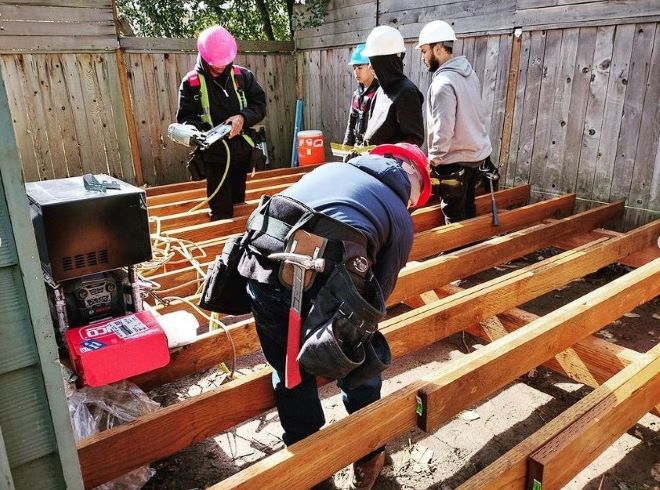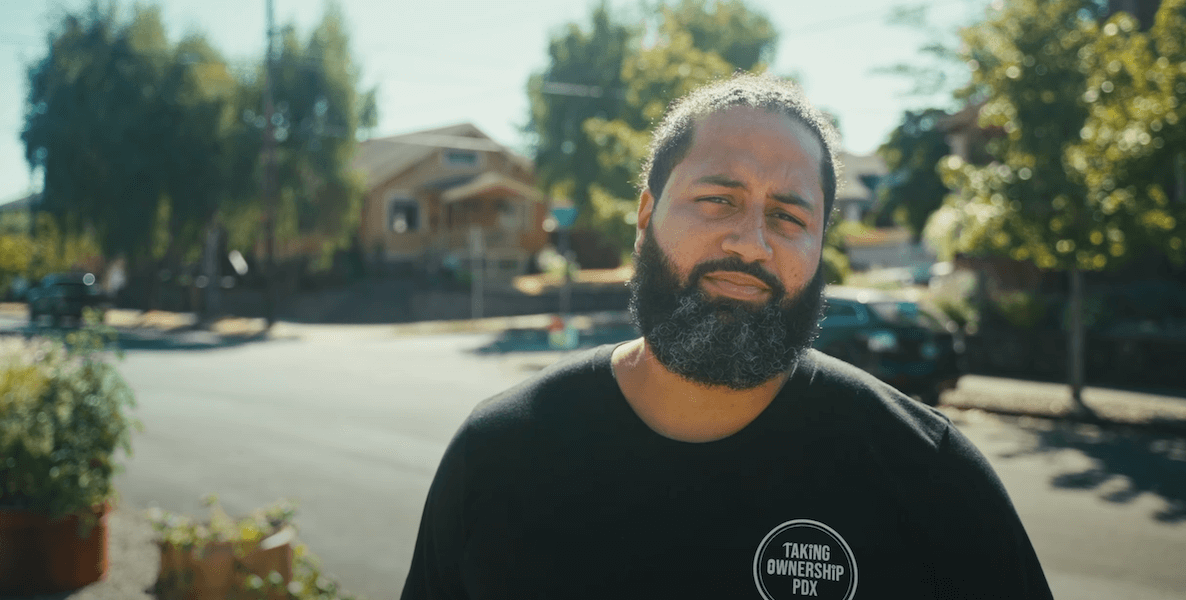In the midst of the racial protests following the murder of George Floyd in 2020, Randal Wyatt started helping Black homeowners in Portland, Oregon fix up their houses to ensure they could stay in their homes and pass on the property to their children. It was, he says, his way to protest the racial inequities that plague his city and country.
Wyatt himself, though, did not actually own a home. He and his identical twin teenage sons lived in what he describes as a “crummy apartment, with mice and stuff.” Then he got an email from a Portland woman named Annie Moss, with what would turn out to be a life-changing subject line: “Transfer My Home to Black Ownership.”
Moss, who had seen Wyatt on the news, was part of a radical reparations group in Portland. She had a second home worth more than $640,000 that she was looking to sell to a Black Portlandian for what was left on her mortgage, about $230,000. Wyatt took her up on the offer, instantly gaining about $400,000 in equity that not only made him a wealthy man — but also created wealth that he can one day pass on to his sons.
The 2008 housing crisis affected Black homeowners at a far greater rate than White homeowners, and the racial wealth gap the Great Recession accelerated has left Black residents in cities like Portland unable to keep up.
That wealth creation — or wealth preservation — is the ultimate mission of Taking Ownership, which uses money donated mostly by individuals like Moss to hire local Black-, woman-, and/or LGBQT+-owned licensed contractors to do skilled home improvement work, like roofing, modernization, kitchen renovations and remediating after fires. Taking Ownership’s community of about 400 volunteers takes on the less skilled work, like cleaning out clutter, clearing debris from yards, and painting.
The average value of each job is about $15,000, though some are significantly higher, and Taking Ownership has also helped some clients get relief from fines and liens imposed by the city because of maintenance issues. The result has been nearly 200 more opportunities for Black Portlandians to ensure ownership is staying in their family.
“If you think about the wealth gap, the Black community naturally is in last place, and you see that a lot in these neighborhoods where affluent, White people are moving in and Black people are getting pushed out,” Wyatt says. “I want to make it easier for some of these middle class people in the Black community who don’t qualify for a lot of services to get the help they need.”
Protest takes many forms
Over the last decade, Portland has become known as one of the — if not the — country’s most gentrified cities. It is, also, the Whitest big city in the country: More than 73 percent of its 635,000 residents are White, according to the 2020 census, with African Americans making up only 5.6 percent of the population.
In part, that is a result of a racist history: Oregon’s charter explicitly barred Black people from residing in the state when it first joined the union in 1857. The 14th Amendment technically made that provision illegal, but the sentiment effectively kept African Americans out of the state for decades afterward. According to a 2016 piece in The Atlantic titled The Racist History of Portland, The Whitest City in America, about 1,000 Black people lived in Oregon in 1890; 30 years later, there were 2,000 Black Oregonians.
An influx of African Americans from the South landed in Portland during the Great Migration after World War II, but — as in cities across the land — they were mostly consigned through redlining to one neighborhood in Northeast Portland: Albina. That’s where Wyatt, a Portland native, spent much of his childhood, and where he lives now with his 19-year-old identical twin sons. “At the time, both northeast and southeast Portland, where I also lived, were diverse,” he recalls. “So I grew up with Black people, a decent amount, particularly in high school.”

As recently as 2010, Wyatt says, Portland was still affordable. But over the last decade that has shifted, with the influx of tech money and of migrants from Los Angeles, New York and other big, expensive cities. The housing crisis in 2008 affected Black homeowners at a far greater rate than White homeowners, and the racial wealth gap the Great Recession accelerated has left Black residents in cities like Portland unable to keep up.
So Albina has gone the way of other historic Black neighborhoods around the country, including Philadelphia’s Graduate Hospital: It, too, has become increasingly White and wealthy, as poorer Black homeowners are unable to maintain their houses, and pay higher taxes and liens against their properties. When they move, it’s to more far-flung neighborhoods or suburbs where they often can’t afford to buy a house, and join the world of renters.
Meanwhile, home ownership in America is still the best way to grow generational wealth: According to a survey by the National Association of Realtors, homeowners became 40 times richer than renters in the last decade, a phenomenon heightened by the pandemic. Yet, in Portland, it is harder to buy a house than ever. Wyatt notes that most of Taking Ownership’s clients are older Portlandians, who purchased their homes decades ago. “Young people can’t afford to buy in the city anymore,” he says.
“I’ve always understood that grassroots efforts, if they get enough traction can inspire, can lead to policy change and can light a fire under government agencies to make meaningful change. That’s what we really need.” — Randal Wyatt of Taking Ownership PDX
As a young man, 38-year-old Wyatt was a rapper, performing music that was about social justice — “rather than more capitalistic pursuits” — like his favorite Hip Hop artists. “When I was making that music, I realized I need to actually practice what I preach — especially when I became a father at 19 years old, and it came to me that community is going to be the most important thing that I can invest in,” he says.
Wyatt started using his performances as ways to connect with and educate young people, and worked in social service jobs, including in the juvenile justice system and as a student advocate at Portland YouthBuilders. He also spent several years studying social science and Black studies at Portland State University, where he learned about the effects of Portland’s historically racist policies.
He was finishing up his degree when George Floyd was murdered, setting off Black Lives Matter protests that in Portland were especially virulent and that lasted for nearly a year. Wyatt mostly sat out the marches, in part because he wasn’t clear on what organizers were trying to accomplish. Instead, he turned to a different kind of action by forming Taking Ownership PDX.
“We need a wide variety of different forms of protests,” he says. “A lot of that looks like organizing. This was an effort to activate allies in a different way, rather than them being on the streets.”
Wyatt’s idea was to recruit volunteers to work on the homes of Black residents. Shortly after announcing the project to his several thousand social media followers, a fan offered to be a guinea pig for one-half of her duplex that needed work, and another reached out to offer money, rather than labor. Wyatt realized he had an opportunity to go big and to hire professionals to do quality, skilled work on his clients’ homes. He launched a fundraising campaign that brought in $25,000 in the first month, and $100,000 the next month.
Many of Taking Ownership’s clients are like Shirley Minor, who was a toddler when her parents paid $30,000 for a brand-new single-family house in the northeastern part of the city. When they died a few years back, the house — now worth about $600,000 — went to Minor, who has since passed it on to her 21-year-old grandson. Minor herself lives a few blocks away in a condo she bought several years ago, which she plans to one day pass on to her son. But in the last few years, keeping up both houses has proven increasingly difficult. The windows on the house were old and drafty; the wooden porch of her condo was rotting; the yards of both houses were covered in weeds, and turning brown from the unusually dry conditions.
Wyatt called Minor to offer her an air conditioner — which she says saved her during the 118-degree days that followed — then sent volunteers and contractors to install new windows, build a new porch, and clean up her yards. “I don’t know what I’d do without Randal’s help,” says Minor, who retired a few months ago from the state of Oregon’s employment division and now lives on a fixed income. “I’ve worked so hard to keep these houses in the family. I need to keep them up.”
Over its three years, Taking Ownership’s work has had ripple effects beyond rehabilitating homes. Working with small local businesses has helped neighborhood economies grow, and brought in more local jobs. The organization is now partnering with local pre-apprenticeship programs — including one Wyatt’s sons are starting in the fall — to train young Portlandians for their certifications in carpentry and other skills that, Wyatt notes, “have been lost in the Black community.” And Wyatt says he is teaming up with several other local groups to get a green energy grant, which would allow them to retrofit Black-owned homes for solar power, while training young workers for clean energy jobs.
“Neighbors have come out when they see a group of volunteers out working on their neighbor’s yard and start asking questions … They start to realize that people don’t like living in rundown homes. There’s probably a reason behind it.” — Randal Wyatt
An unexpected benefit has been connecting neighbors who have otherwise viewed each other warily. In gentrifying neighborhoods, new homeowners often see older homes that are falling apart as eyesores or nuisances; calls to the city about an overgrown yard or collapsing porch can result in escalating fines from Portland’s Bureau of Development Services (BDS) — which makes financially strapped homeowners even more vulnerable to losing their houses. That’s why the group has started working with BDS to eliminate fines once contractors or volunteers have completed repairs.
But news reports about Taking Ownership and the group’s volunteers — many of whom live in the communities they serve — have also worked to get neighbors to stop making the calls to begin with, by spreading the idea of helping, rather than complaining.
“I can’t tell you how many times neighbors have come out when they see a group of volunteers out working on their neighbor’s yard and start asking questions,” Wyatt says. “And then they’re inspired, and later that neighbor has come back and helped this Black homeowner with something else. They start to realize that people don’t like living in rundown homes. There’s probably a reason behind it.”
Fighting gentrification — and history
In terms of gentrification, Philadelphia is still legions away from Portland, but like in Portland, it has become increasingly difficult for low-income residents to find and keep housing in neighborhoods that are near to services, transportation and jobs. That’s because while housing is still relatively affordable here compared to other Northeastern cities, wages have not kept pace, putting market rate rents and mortgages out of reach.
It’s true here, as it is most everywhere, that the most affordable house is the one you’re already in, especially for residents who have owned their homes for decades. But Philadelphia also suffers from an older housing stock — over 40 percent were built before 1939 — and rowhouses that are often not the best places to age in place, given the steps required to enter or use a bathroom. That requires retrofitting homes, among other things, to maintain quality of life. And that, needless to say, costs thousands of dollars.

The City has several programs in place to help with different types of issues for homeowners who qualify, including grants through the Basic Systems Repair Program, which offers low-interest homeowners help with certain kinds of repairs. In 2021 and 2022, the BSRP worked with close to 3,000 homeowners throughout the City.
The state legislature passed State Sen. Nikil Saval’s Whole Home Repair Fund, which will send $21 million in American Rescue Plan Act money to the Philadelphia Housing Development Corporation, which administers the City’s repair programs. And, last week, the City announced a proposal to give another $50 million in federal Hurricane Ida relief funds to homeowners affected by the 2021 storm.
The estimate for what’s actually needed just in storm recovery, though, is all you need to know about the need here: Ida alone caused more than $810 million in damage to homes, according to city officials. Many of those homeowners are still waiting for the funds to fix up their homes, not to mention weather- and climate-proof them for future storms.

Taking Ownership does not operate at the scale of either Philadelphia or Portland government-run home repair programs. The mission is also narrower: Fighting alongside Black homeowners to staunch the effects of gentrification on Black neighborhoods. Even before 2020, Wyatt had thought a lot about what reparations might look like for Black Americans, noting that both Native Americans and Asian Americans, in the wake of World War II internment, have received some compensation from the federal government — “not enough, by any means, but at least something,” he says — but not African Americans, despite years of debate about the issue.
Taking Ownership, funded by mostly White and relatively wealthy donors, was Wyatt’s answer to that question of reparations, with home ownership as the currency. “White supremacy is very much predicated on land ownership, taking land and keeping land, excluding people from getting land,” he says. “I thought this could be a way to address that.”
After Wyatt himself became a homeowner, he then worked with another Portland housing group, Back Home ADU, which helps homeowners build small houses in their yards to rent out to residents earning less than 80 percent of the median income for the area. The nonprofit connected Wyatt with a low-interest loan, provided him with builders and designers, and with a property management company. With their help, he erected a 315-square-foot, one-bedroom house that he now rents out.
And, along with Moss, he has launched PDX Housing Solidarity Project to help Black and Indigenous residents prepare to buy a home by advising them on how to clear their credit, pay off debt and connect to a lender, and then raising money from about 120 “affluent allies” for a down payment. So far, the informal project has raised about $500,000, including $75,000 for one homeowner.
All of these projects hearken back to the mission Wyatt crafted in 2020, while his city raged about the murder of George Floyd, and he sought his own form of protest to make change.
“I’ve always understood that grassroots efforts, if they get enough traction can inspire, can lead to policy change and can light a fire under government agencies to make meaningful change,” he says. “That’s what we really need.”
![]() MORE HOUSING JUSTICE FROM THE CITIZEN
MORE HOUSING JUSTICE FROM THE CITIZEN



